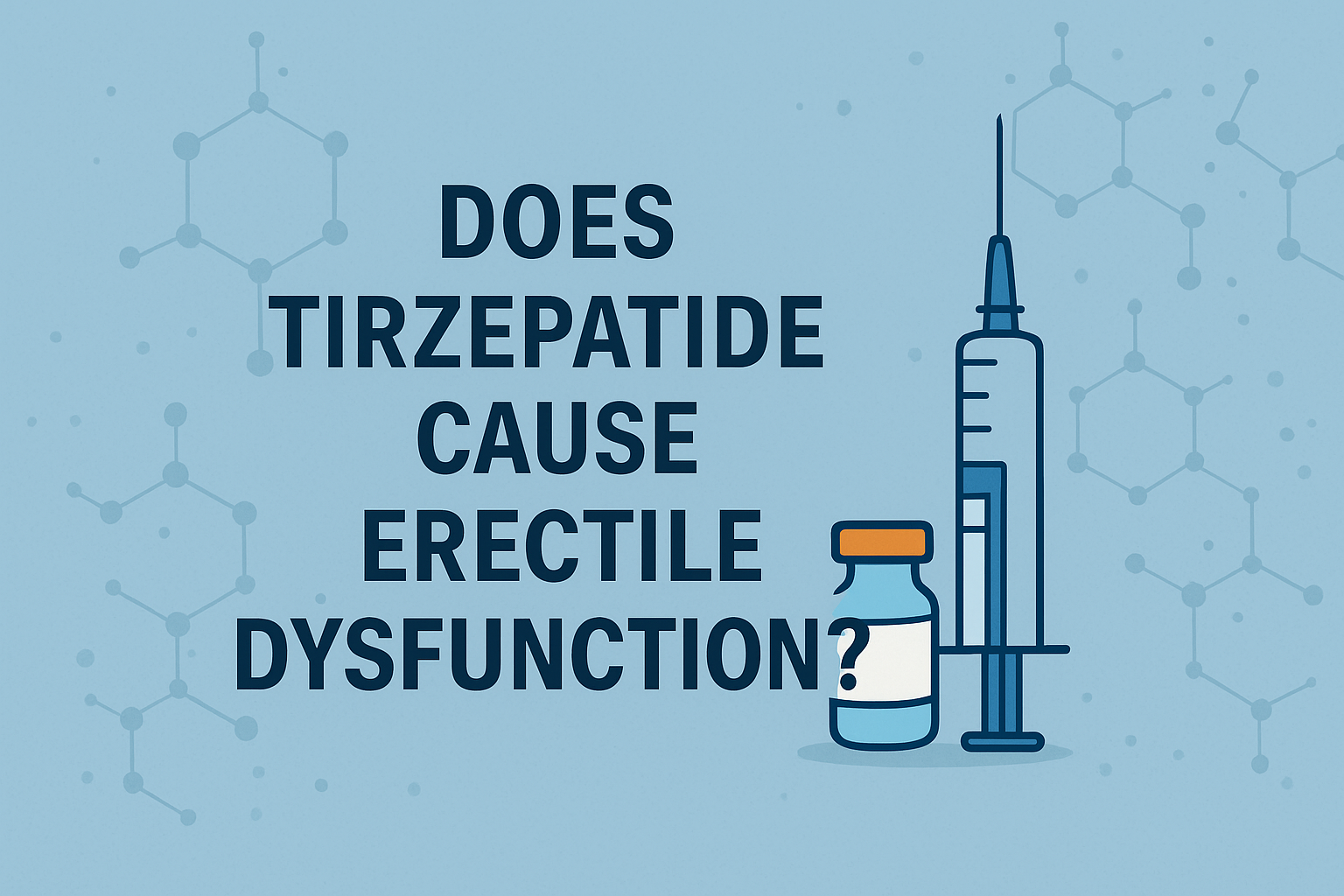Disclaimer
This article is for informational purposes only and does not constitute medical advice. Always consult a licensed healthcare professional before starting, stopping, or adjusting any medication.
Tirzepatide, a new-generation medication for type 2 diabetes and weight management, has gained enormous attention for its dramatic effects on blood sugar control and body fat reduction. Sold under brand names, it works through dual incretin receptor agonism — a mechanism that targets both GLP-1 and GIP pathways.
However, as its popularity grows, so do questions about its possible side effects — especially those concerning sexual health. One of the most searched concerns is:
Does tirzepatide cause erectile dysfunction (ED)?
This article examines the available scientific evidence, explains how tirzepatide affects the body, and clarifies whether the medication could cause or even help with erectile function.
Understanding Tirzepatide
Tirzepatide is an injectable medication designed to help regulate blood sugar levels and reduce body weight. It belongs to a class of drugs known as incretin mimetics or GLP-1 receptor agonists, but it stands out because it activates two receptors:
- GLP-1 (Glucagon-like peptide-1) – improves insulin secretion and delays gastric emptying.
- GIP (Glucose-dependent insulinotropic polypeptide) – supports fat metabolism and insulin sensitivity.
By working on both pathways, tirzepatide enhances metabolic efficiency — resulting in improved glucose control, lower appetite, and significant fat loss.
Why Sexual Side Effects Are a Concern
Erectile dysfunction (ED) can result from multiple overlapping causes — hormonal imbalance, vascular disease, nerve damage, or psychological stress. Since tirzepatide impacts metabolism, weight, and hormones, some men worry that these changes could influence sexual function.
The question is valid: while weight loss drugs bring several benefits, rapid physiological changes can occasionally disrupt sexual performance, at least temporarily.
Does Tirzepatide Cause Erectile Dysfunction?
Short Answer:
There is no direct clinical evidence that tirzepatide causes erectile dysfunction.
In fact, current data suggest that tirzepatide may actually improve sexual function in many men, especially those whose ED was related to obesity, diabetes, or poor circulation.
Let’s break this down with scientific reasoning.
How Tirzepatide Affects the Body (and Sexual Function)
1. Improves Blood Sugar Control
Chronic high blood sugar damages small blood vessels and nerves — including those that supply the penis. This is one of the leading causes of diabetic erectile dysfunction.
By improving insulin sensitivity and lowering glucose levels, tirzepatide helps restore vascular and nerve health, which are critical for maintaining erections.
Supporting Evidence:
In a 2022 New England Journal of Medicine trial, tirzepatide significantly improved HbA1c levels in patients with type 2 diabetes — a key indicator of long-term glucose control. Better glycemic control usually means reduced risk of diabetic neuropathy and improved erectile response over time.
2. Promotes Weight Loss
Excess body fat — particularly visceral fat — contributes to:
- Reduced testosterone levels
- Chronic inflammation
- Poor vascular health
Tirzepatide helps reduce body fat dramatically, which may boost testosterone and improve circulation.
Clinical Insight:
Obese men often experience improvements in testosterone and erectile performance after weight loss, even without medication. Since tirzepatide is one of the most effective modern weight-loss drugs, it indirectly benefits sexual health by addressing root causes like metabolic dysfunction.
3. Enhances Cardiovascular Health
Healthy blood flow is essential for erections. Tirzepatide helps lower:
- Blood pressure
- LDL (“bad”) cholesterol
- Triglycerides
This supports endothelial function, the ability of blood vessels to relax and carry blood efficiently to erectile tissue. Improved endothelial performance is directly linked to stronger erections.
4. Possible Hormonal Adjustments
Some users experience hormonal changes while losing weight, including shifts in testosterone, leptin, and estrogen levels.
While mild hormone fluctuations are common during weight loss, there’s no clinical evidence that tirzepatide lowers testosterone or causes hormone-related ED.
In contrast, weight reduction often leads to:
- Higher free testosterone
- Lower estrogen
- Improved libido and sexual satisfaction
5. Psychological Effects
Sexual function isn’t purely physical. Mood, energy, and confidence all play major roles.
Some tirzepatide users report fatigue or decreased appetite during initial weeks, which may transiently affect mood or libido. These effects typically subside as the body adapts to the drug.
However, rapid improvements in body composition and self-image often enhance sexual confidence and reduce performance anxiety.
When ED Might Appear During Tirzepatide Use
Even though tirzepatide doesn’t cause erectile dysfunction directly, a few secondary factors could lead to temporary issues in some men:
1. Caloric Deficit and Energy Levels
Drastic calorie reduction during rapid weight loss can lower energy availability, leading to fatigue and reduced libido.
Solution: Maintain adequate protein, hydration, and essential nutrients.
2. Dehydration
GLP-1 medications can cause mild nausea or decreased fluid intake. Dehydration affects blood pressure and circulation, temporarily weakening erections.
Solution: Drink enough water daily, especially during initial weeks of treatment.
3. Stress and Adjustment Period
Adjusting to a new medication can cause anxiety or stress, which may indirectly affect sexual performance.
Solution: Give your body 4–6 weeks to adapt before evaluating changes in sexual function.
4. Drug Interactions
If you’re taking antihypertensives, antidepressants, or diabetes medications, these might influence erection quality.
Tirzepatide itself rarely interacts negatively, but medication combinations should always be reviewed with your doctor.
Can Tirzepatide Actually Improve Erectile Function?
Yes — in many cases, it can.
Let’s look at the reasons why men with type 2 diabetes and obesity, who are at higher risk of ED, may experience improvements while using tirzepatide.
1. Better Blood Flow
Weight loss, improved insulin sensitivity, and reduced inflammation all support vascular health, a cornerstone of strong erections.
2. Improved Nerve Function
Chronic hyperglycemia damages the nerves that control erection reflexes. Tirzepatide’s glucose-lowering effect reduces further nerve injury and may even promote repair.
3. Higher Testosterone
Losing fat decreases aromatase enzyme activity, reducing estrogen conversion and freeing up more testosterone — a natural boost to libido and erectile strength.
4. Better Mental Health
Studies link obesity and diabetes with depression and low self-esteem. Tirzepatide-induced weight loss can elevate mood and self-image, improving overall sexual satisfaction.
What the Studies Say
While no clinical trial has directly measured tirzepatide’s effects on erectile function, research on related GLP-1 receptor agonists provides insight.
| Study | Drug | Findings |
|---|---|---|
| Giagulli et al., 2018 (Journal of Endocrinological Investigation) | Liraglutide | Improved erectile function scores and testosterone in obese men with ED |
| Jensterle et al., 2020 (Obesity Reviews) | GLP-1 analogs | Improved reproductive hormone profiles and sexual satisfaction |
| Tirzepatide Trials (NEJM, 2022) | Tirzepatide | Significant metabolic and vascular improvements (indirect ED benefits) |
These findings suggest that GLP-1 and dual agonists like tirzepatide may improve erectile function indirectly, by addressing the root metabolic and vascular problems that cause ED.
Reported Sexual Side Effects
In clinical trials and post-marketing reports, sexual dysfunction has not been listed as a common side effect of tirzepatide.
Most reported side effects include:
- Nausea and vomiting
- Diarrhea or constipation
- Fatigue or dizziness
- Reduced appetite
No statistically significant link to ED, decreased libido, or infertility has been found in any published data.
When to Talk to Your Doctor
If you notice erectile issues after starting tirzepatide, don’t panic. Instead:
- Review lifestyle factors – hydration, nutrition, sleep, and stress.
- Check for medications – some drugs for blood pressure, depression, or prostate issues can cause ED.
- Evaluate weight loss speed – overly aggressive calorie restriction can lower energy and libido.
- Request lab tests – including testosterone, HbA1c, and lipid profile.
In most cases, these issues are temporary and reversible once your body adjusts.
Tips to Support Sexual Health While on Tirzepatide
- Stay Hydrated – Aim for at least 2–3 liters of water per day.
- Eat Enough Nutrients – Include zinc, magnesium, and omega-3s in your diet.
- Exercise Regularly – Cardiovascular exercise boosts nitric oxide and blood flow.
- Manage Stress – Practice deep breathing, meditation, or mindfulness.
- Sleep Well – Quality sleep maintains testosterone and mood balance.
- Avoid Smoking and Excess Alcohol – Both damage vascular and hormonal health.
- Discuss Testosterone Levels – If symptoms persist, check hormonal balance.
Key Takeaways
- Tirzepatide does not cause erectile dysfunction according to current research.
- It may improve erectile performance indirectly through better vascular, hormonal, and metabolic health.
- Any temporary libido changes are usually due to rapid weight loss or energy fluctuations, not the medication itself.
- Maintaining hydration, balanced nutrition, and exercise helps sustain sexual function during treatment.
If ED persists, consult a healthcare professional to rule out other underlying conditions such as cardiovascular disease or hormonal imbalance.
Final Verdict
Tirzepatide’s primary role is improving metabolic and cardiovascular health — both of which are crucial for normal erectile function.
Rather than causing erectile dysfunction, it’s far more likely to help prevent or reverse it in men with obesity or diabetes.
So, while anecdotal experiences may vary, the evidence points toward a neutral or positive impact on sexual health. Always discuss any changes in libido or performance with your doctor, especially when using medications that affect hormones, metabolism, or weight.

